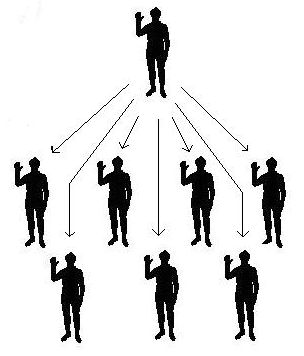 People very often expect authorities to possess superior information. After all, the assumptions of the 20th century were that those at the top of large systems have information the rest of us don’t, and that they make better decisions because of it. This was the lesson of the factory, the military and government. In all cases, those at the top were believed to have the best information.
People very often expect authorities to possess superior information. After all, the assumptions of the 20th century were that those at the top of large systems have information the rest of us don’t, and that they make better decisions because of it. This was the lesson of the factory, the military and government. In all cases, those at the top were believed to have the best information.
In actual practice, however, those at the top don’t get the best information. An FBI agent in Minneapolis, to use a famous example, knew all about the bizarre behavior of the 9/11 hijackers, but that information never reached those who were expected to use it.
There are many more examples, of course. The military is full of them; ask a 20-year corporal or sergeant some time. Pretty much every mid-level manager at a corporation can tell you the same types of stories. And by now we should all know how deeply “out of it” high level politicians are.
The problem is not the people involved, however; the problem is the structure. All of these are hierarchies, and all, necessarily, pass information up and down between levels of the structure. And that is a problem. The crucial fact is this:
As information is passed through the levels of a hierarchy, it is filtered.
This much is not seriously questionable. Corporate analysts have been talking about it for decades, trying to “flatten” the corporation. And again, this is caused by the structure itself, not by the quality of the individuals involved. A person with exceptionally high integrity will filter less, but since we’re talking about structures involving thousands of people, that’s not a significant factor. Hierarchies filter information because of their structure.
Filtered How?
Information flow in a hierarchy is filtered in any number of ways, with the political schemes of the participants being a major factor. (Political scheming in the corporate sense, that is: lining up allies, controlling others, and so on… relying upon influence more than substance.)
The more pervasive factor, however, involves the control of will. That sounds odd at first, and even irrelevant, but it isn’t.
The constraint of individual will is the fundamental operating feature of hierarchy. The hierarchy must get individual humans to do the hierarchy’s will rather than their personal will, if it is to survive.
Individuals within a hierarchy must obey orders. They must serve the goals of the system rather than their own. The hierarchy cannot survive without this. It is the fundamental operation.
Hierarchies obtain this sacrifice of will in a variety of ways, the chief of which are,
-
Corporations offering paychecks in return for the correct sacrifice of personal will. Also offering status.
-
Governments offering a sense of belonging in return for the correct sacrifice of personal will. Additionally the promise of protection, agreeing to stand as the responsible party (removing the threat of shame from the individual) and providing someone to blame, generally in the form of political parties and their leaders. (Allowing us to blame the parties, but not the overall structure.)
The general culture of a hierarchy, then, majors upon the control of individual will.
The filtration of information in a hierarchy concentrates the control of individual will. In some cases this involves orders and punishments. In others, as in political campaigns, it focuses upon bending the will of the individual to the desires of the structure. That is, people are frightened or seduced rather than forced.
The quality of information within the hierarchy is distorted and tends to become anti-individual, pro-collective, pro-indoctrination and pro-authority. In the end, hierarchy tends to be contemptuous of stand-alone life, smaller systems and non-centralized systems.
Hierarchy recognizes other hierarchies and treats non-hierarchies as foreign. Large recognizes large and sees small as a nuisance.
A Final Illustration
I’ll leave you with one final illustration of this effect. It’s something Bill Bonner passed along in 2009, quoting a US Senate functionary with whom he had recently met:
You don’t understand, these people live in a Bubble World. They’re protected from the real world by their staffs and by the system itself. You imagine that they would know what is going on. But they don’t. They know less than we do. And they’ll be the last to find out. They are so busy meeting constituents…dealing with donors…working out deals with their political parties and supporters… and feeling like big shots… they don’t really have any time to study the issues. So they count on staff and party committees to tell them what to say, how to vote… and what to think.
So, when you see people at the top of hierarchies disconnected from reality, remember that the structure itself is the problem.
**
